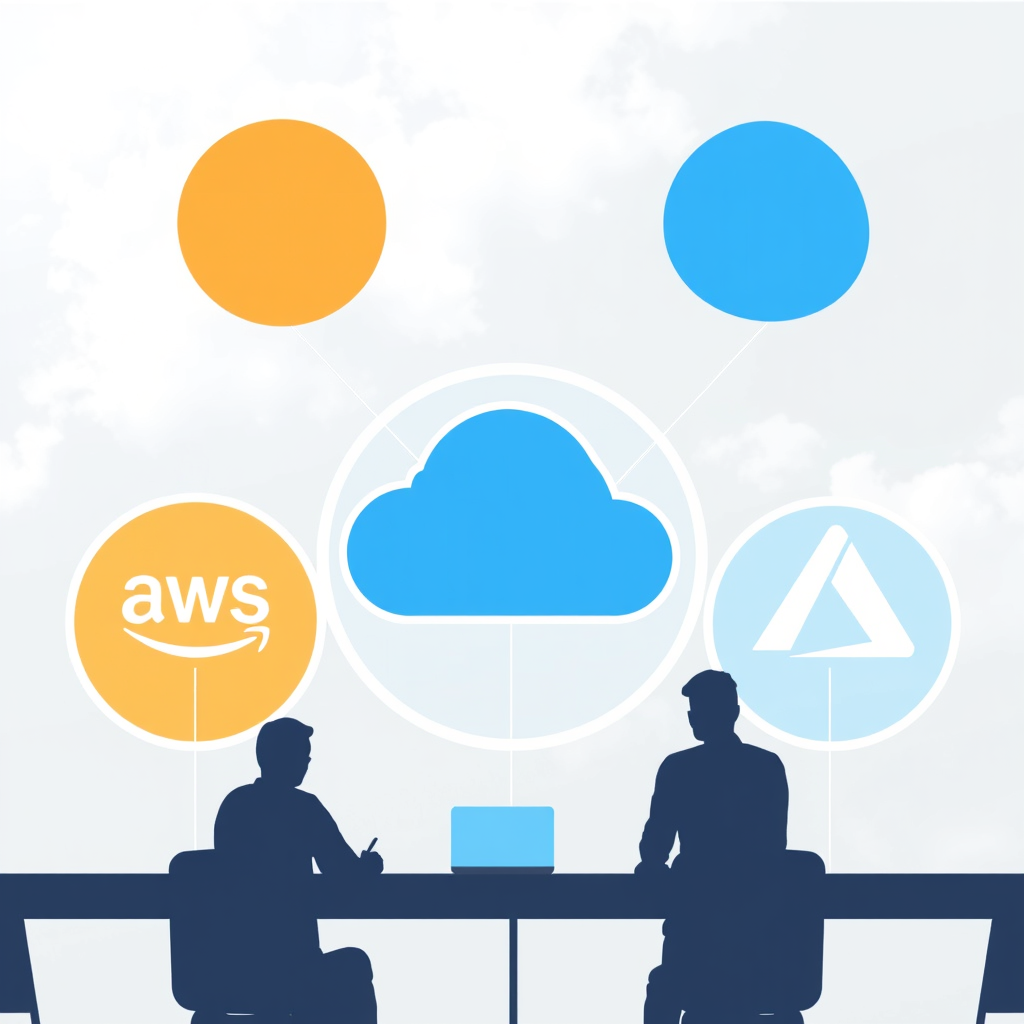
Choosing the Right Cloud Provider: AWS vs. Google Cloud vs. Azure
In today’s digital landscape, migrating to the cloud is no longer a question of “if,” but “when” and “how.” The cloud offers scalability, cost-effectiveness, and enhanced security, making it an indispensable tool for businesses of all sizes. However, with numerous cloud providers vying for your attention, selecting the right one can feel overwhelming. This article provides a comprehensive comparison of the three leading cloud platforms: Amazon Web Services (AWS), Google Cloud Platform (GCP), and Microsoft Azure, helping you make an informed decision that aligns with your specific business needs. “Technology helps businesses grow faster and smarter,” and choosing the correct cloud provider is a crucial step in that growth.
Table of Contents
- Introduction
- Amazon Web Services (AWS)
- Google Cloud Platform (GCP)
- Microsoft Azure
- Side-by-Side Comparison
- Choosing the Right Provider
- FAQ
- Conclusion
Introduction
Before diving into the specifics of each platform, it’s important to understand that each provider offers a comprehensive suite of services covering computing, storage, databases, networking, analytics, machine learning, and more. The key differences lie in their strengths, pricing models, and overall ecosystems.
Amazon Web Services (AWS)
AWS is the most mature and widely adopted cloud platform, offering a vast array of services and a large community of users and partners.
Pros of AWS
- Mature and Comprehensive: AWS boasts the largest selection of services, providing solutions for virtually any IT need.
- Large Community and Support: A vast community provides ample support, documentation, and third-party integrations.
- Scalability and Reliability: AWS is known for its robust infrastructure and ability to scale resources on demand.
Cons of AWS
- Complex Pricing: The extensive range of services can make pricing complex and difficult to manage.
- Steep Learning Curve: The sheer number of services can be overwhelming for newcomers.
Google Cloud Platform (GCP)
GCP is known for its innovation in areas like data analytics, machine learning, and containerization.
Pros of GCP
- Innovation in Data and AI: GCP excels in data analytics and machine learning, offering cutting-edge services like BigQuery and TensorFlow.
- Containerization Leader: GCP is the birthplace of Kubernetes, the leading container orchestration platform.
- Competitive Pricing: GCP offers sustained use discounts and preemptible VMs, potentially leading to cost savings.
Cons of GCP
- Smaller Market Share: Compared to AWS and Azure, GCP has a smaller market share, potentially limiting community support.
- Less Mature in Some Areas: While strong in data and AI, some other areas may not be as mature as AWS.
Microsoft Azure
Azure is a strong choice for organizations already invested in the Microsoft ecosystem, offering seamless integration with Windows Server, .NET, and other Microsoft products.
Pros of Azure
- Seamless Microsoft Integration: Azure integrates seamlessly with Windows Server, .NET, and other Microsoft technologies.
- Hybrid Cloud Capabilities: Azure offers strong hybrid cloud capabilities, allowing organizations to extend their on-premises infrastructure to the cloud.
- Enterprise-Grade Security: Azure provides robust security features and compliance certifications.
Cons of Azure
- Vendor Lock-in: Tight integration with Microsoft technologies can lead to vendor lock-in.
- Complex Pricing: Like AWS, Azure’s pricing can be complex and difficult to understand.
Side-by-Side Comparison
Compute Services
- AWS: EC2 (Elastic Compute Cloud) offers a wide variety of instance types.
- GCP: Compute Engine provides customizable virtual machines.
- Azure: Virtual Machines offers a range of VMs optimized for different workloads.
Storage Services
- AWS: S3 (Simple Storage Service) is a highly scalable object storage service.
- GCP: Cloud Storage provides scalable and durable object storage.
- Azure: Blob Storage is designed for storing unstructured data.
Database Services
- AWS: RDS (Relational Database Service) supports various database engines like MySQL, PostgreSQL, and SQL Server.
- GCP: Cloud SQL offers managed database services for MySQL, PostgreSQL, and SQL Server.
- Azure: SQL Database is a fully managed SQL Server database service.
Pricing
Pricing models vary significantly between providers and can be complex. Consider factors like reserved instances, sustained use discounts, and spot instances to optimize costs. Each provider offers pricing calculators to help estimate costs based on your specific needs.
Choosing the Right Provider
The best cloud provider for your business depends on your specific requirements and priorities. Consider the following factors:
- Business Needs: What are your specific IT needs and goals?
- Existing Infrastructure: Do you have existing investments in Microsoft or other ecosystems?
- Technical Expertise: What is your team’s level of expertise with each platform?
- Budget: What is your budget for cloud services?
- Compliance Requirements: Do you have any specific compliance requirements?
FAQ
Q: Which cloud provider is the cheapest?
A: It’s difficult to definitively say which provider is cheapest, as pricing varies based on usage patterns and specific services. GCP often offers competitive pricing, but AWS and Azure also offer various discounts and pricing options. It’s essential to use pricing calculators and monitor your usage to optimize costs.
Q: Which cloud provider is the easiest to learn?
A: Ease of learning is subjective and depends on your prior experience. Many find Azure relatively easy to learn if they already have experience with Microsoft technologies. AWS has extensive documentation and a large community, which can be helpful for beginners. GCP is often praised for its well-designed user interface.
Q: Can I use multiple cloud providers?
A: Yes, using multiple cloud providers, known as a multi-cloud strategy, can offer several benefits, including increased resilience, reduced vendor lock-in, and access to best-of-breed services from different providers. However, managing a multi-cloud environment can be complex.
Conclusion
Choosing the right cloud provider is a critical decision that can significantly impact your business’s success. By carefully evaluating your needs and comparing the strengths and weaknesses of AWS, GCP, and Azure, you can make an informed decision that aligns with your goals. Remember to consider factors like pricing, technical expertise, and integration with existing infrastructure.
If your business needs an efficient website or digital system, contact the Doterb team today. We can help you assess your requirements, develop a cloud strategy, and implement the right solutions to drive your business forward.
